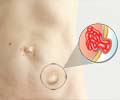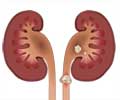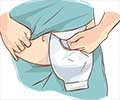Incisional Hernias - Causes
Incisional hernias are caused due to stretching of scar tissue that forms after surgery and occurs due to constant pressure of abdominal contents on the scar.
Not all abdominal surgeries will lead to incisional hernia, but any full thickness abdominal incision can leave a weakness and make that area prone to hernia. Usually a proper closure and adequate post-operative measure avoids the problem. However, sometimes despite the best care, a person may develop the hernia and at other times it can be predicted depending on the patient’s general condition and the type of surgery performed.
Normally there are three layers covering the abdominal contents. These include a thin inner sheet called the peritoneum, a thick middle layer of muscles and the third outer layer – the outer skin. An incisional hernia forms usually due to weakness of the thick layers of muscles. There are various factors that can lead to the weakness or hernia formation and these factors generally can be broadly looked at as –
- Mechanical factors
- Patient-related factors
- Or Technical factors
Mechanical factors
Mechanical factors increase the intra-abdominal pressure after an operation and causes the hernia. Common causes include-
- Chronic cough- Coughing and vomiting are associated with a brief but significant increase in intra-abdominal pressure. This, again, leads to too much tension on the incision and possible breakdown of the incision.
- Lifting heavy weights- Obviously, if a patient lifts something too heavy immediately after the operation, he or she can also tear the incision and cause a hernia.
- Postoperative ileus- This occurs when the abdomen becomes distended because the intestines are not working properly after an operation. The swelling of the intestines increases the pressure in the abdomen and places tension on the incision. The tension then leads to defective healing.
- Straining to move bowels after surgery– Constipation is another culprit for hernia formation. During the post-operative period and for a few months afterwards one should avoid straining while moving the bowels.















i am 54 years lady at present i have an incisional Hernia, 4 years back i had undergone operation uterus removing whether immediate surgery is required but i don't have any pain